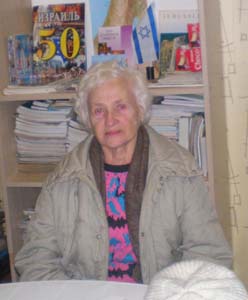

Project «Voices of Jewish settlements. Vitebsk region.»פיתוח קשרי התרבות בין העמים של ישראל ובלרוס
|
|---|
Website search |
|
MainNew publicationsContactsSite mapVitebsk regionMogilev regionMinsk regionKonstantin Karpekin
|
I WILL NEVER FORGET THIS DAYThe Jews of Surazh were executed on August 3rd 1941. I will never forget that day, - said Clara Semionovna.  Klara Salkova
Klara Salkova
Clara Semionovna Lesina was born in Vitebsk in 1924. When Germans invaded Vitebsk on July 11th her family fled the city. They travelled from village to village. They did not tell anyone they were Jews and people gave them shelter. - Then we reached Surazh. There Nazis murdered my sister on August 3rd. - How did it happen? Why did they not kill you? - I was very active. When we arrived in Surazh I made friends with two girls. We all went to the forest for a walk. When we were coming back, a local woman told us: “Your relatives were taken away.” Thus we realized that things were serious. - Did the people in Surazh know you are Jewsih? - When we came to Surazh, we found there people with the same family name as ours – the Lesins. We settled in their house while our sister with her baby went to another house because there were fewer people. Our houses stood next to each other. - Was your sister married? - Yes, the baby was a year and two months old. - Where was your sister’s husband? - He had been drafted to the army when the war began. - What did your mother tell you? - She saw the Nazis taking Jews across the river. She saw sister Fania walking with a woman… My mom was at home with the grandson when a German man looked into the house and said: “Be quiet. Do not go anywhere. If anyone knocks on the door, do not open.” So, Germans were different as well. My friend Natasha and I decided to go and check what happened to my sister and the other Jews. We walked to the outskirts of Surazh and spotted a German man on the pavement. He told us: “Girls, don’t go there. There will be shootings.” We got scared and turned back. Later Natasha and I decided to cross the frontline. We left mother and my nephew in Surazh and set off. But later I started feeling bad that I had left my family to die, so we came back. When we arrived, we found the house empty. We began looking for my family. It turned out that the Jews that survived were made to live in a half-destroyed house. Thus we headed there. As I saw my mother I said: “Mom, we all have to leave.” “We are not allowed”, - she replied. “Who is to allow you? Fania was killed. Are we just going to sit here and wait for our turn?” I convinced her. The house was not guarded and we left in the evening. Again were wandering from village to village. In December, when walking became difficult because of the cold, we were given shelter in a house in Zaikovo. We stayed in that house until February 23rd 1942. They did not ask us whether we were Jewish or not. On February 23rd we joined the local partisans who managed to send us to Cheboksary. In Cheboksary I went to a law school and got married. Arkady Shulman |
|||
|
|
Jewish settlements in Vitebsk regionVitebsk • Albrehtovo • Babinovichi • Baran • Bayevo • Begoml • Beshenkovichi • Bocheikovo • Bogushevsk • Borkovichi • Braslav • Bychiha • Chashniki • Disna • Dobromysli • Dokshitsy • Druya • Dubrovno • Glubokoye • Gorodok • Kamen • Kohanovo • Kolyshki • Kopys • Krasnopolie • Kublichi • Lepel • Liady • Liozno • Lukoml • Luzhki • Lyntupy • Miory • Obol • Oboltsy • Orsha • Osintorf • Ostrovno • Parafianovo • Plissa • Polotsk • Prozorki • Senno • Sharkovshina • Shumilino • Sirotino • Slaveni• Smolyany • Surazh • Tolochin • Ulla • Verhnedvinsk • Vidzy • Volyntsy • Yanovichi • Yezerishe • Zhary • Ziabki • |
Main |
New publications |
Contacts |
Site map |
Vitebsk region |
Mogilev region |
Minsk region |